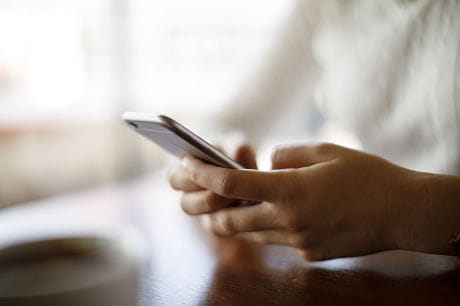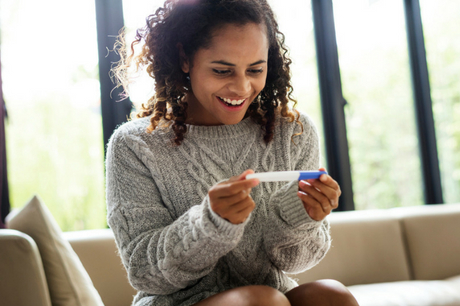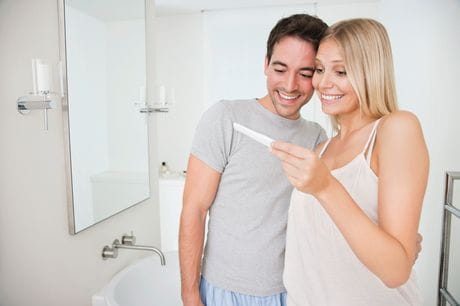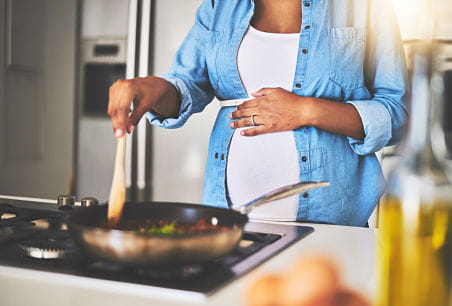Are fertility-tracking apps right for you?
Hint: they’re not for everyone
Conceiving a child can be unpredictable and complicated. Some parents-to-be become pregnant in short order, but most reportedly take between six and 12 months starting from the day they decide to grow their family.
With so much variety among people’s experiences, it’s no surprise that some hopeful mothers have anxiety about their own fertility and look to old wives’ tales and various tools for education and improved chances. And what better way to keep an “eye” on your body than through a device that hardly leaves your side?
Enter fertility apps for your smartphone, which have exploded in popularity over the last several years. Most are meant to track menstrual cycles in order to identify your most fertile time, or your fertile window.
“There are over 100 fertility apps available for all types of smartphones,” says Dr. Brian Murray, OBGYN at Geisinger Mt. Pleasant. “Some are even FDA-approved.” Most free options use the rhythm or calendar method based on user data. Others use a wearable device to track your basal body temperature, pinpointing peak fertility. These are usually associated with a subscription or device cost.
“The apps that track basal body temperature are usually more effective and might be a better first choice,” says Dr. Murray, because women’s menstrual cycles can be more or less than the standard 28 days, rendering a calendar less effective. “Measuring a more in-depth factor, like your temperature, offers a more customized experience than trusting a universal timeline.”
“During your most fertile days, your basal body temperature increases,” states Dr. Murray. “This type of tracking is a natural, effective way to maximize your chances, as long as you have a healthy and regular menstrual cycle.”
Long before the arrival of fertility apps, specialized thermometers were available to take this temperature reading, but it would have to be done in the morning upon waking when your body is already warming up. With wearable devices, a reading can be made while you’re still asleep.
“Women with polycystic ovary syndrome (PCOS) often have very irregular periods and a higher, often irregular basal body temperature,” says Dr. Murray. “This might make it harder for the app to identify the trends necessary to plot your cycle.”
There are also limits to the sophistication of any fertility app. If a couple is having trouble conceiving due to hormonal or physical issues, a doctor’s input might be necessary.
“Apps are merely a guideline,” notes Dr. Murray. “There’s no match for your doctor’s expertise when it comes to complicated health matters.”
Brian J. Murray, MD, is an obstetrician-gynecologist at Geisinger Mt. Pleasant in Scranton, PA. Our women’s health specialists are here to provide the care you need throughout your pregnancy and childbirth. To schedule an appointment with a Geisinger OBGYN or another women’s health specialist, call 800-275-6401 or visit geisinger.org.
With so much variety among people’s experiences, it’s no surprise that some hopeful mothers have anxiety about their own fertility and look to old wives’ tales and various tools for education and improved chances. And what better way to keep an “eye” on your body than through a device that hardly leaves your side?
Enter fertility apps for your smartphone, which have exploded in popularity over the last several years. Most are meant to track menstrual cycles in order to identify your most fertile time, or your fertile window.
“There are over 100 fertility apps available for all types of smartphones,” says Dr. Brian Murray, OBGYN at Geisinger Mt. Pleasant. “Some are even FDA-approved.” Most free options use the rhythm or calendar method based on user data. Others use a wearable device to track your basal body temperature, pinpointing peak fertility. These are usually associated with a subscription or device cost.
“The apps that track basal body temperature are usually more effective and might be a better first choice,” says Dr. Murray, because women’s menstrual cycles can be more or less than the standard 28 days, rendering a calendar less effective. “Measuring a more in-depth factor, like your temperature, offers a more customized experience than trusting a universal timeline.”
Charting basal body temperature
Mapping changes in basal body temperature, or the temperature of your body at its lowest during sleep, is an effective way to track your ovulation cycle.“During your most fertile days, your basal body temperature increases,” states Dr. Murray. “This type of tracking is a natural, effective way to maximize your chances, as long as you have a healthy and regular menstrual cycle.”
Long before the arrival of fertility apps, specialized thermometers were available to take this temperature reading, but it would have to be done in the morning upon waking when your body is already warming up. With wearable devices, a reading can be made while you’re still asleep.
Are fertility apps effective?
Fertility tracking apps may not be as effective for everyone. Due to various medical conditions, women may not experience regular periods, or periods at all, which makes the calendar method flawed.“Women with polycystic ovary syndrome (PCOS) often have very irregular periods and a higher, often irregular basal body temperature,” says Dr. Murray. “This might make it harder for the app to identify the trends necessary to plot your cycle.”
There are also limits to the sophistication of any fertility app. If a couple is having trouble conceiving due to hormonal or physical issues, a doctor’s input might be necessary.
“Apps are merely a guideline,” notes Dr. Murray. “There’s no match for your doctor’s expertise when it comes to complicated health matters.”
Brian J. Murray, MD, is an obstetrician-gynecologist at Geisinger Mt. Pleasant in Scranton, PA. Our women’s health specialists are here to provide the care you need throughout your pregnancy and childbirth. To schedule an appointment with a Geisinger OBGYN or another women’s health specialist, call 800-275-6401 or visit geisinger.org.

Content from General Links with modal content



